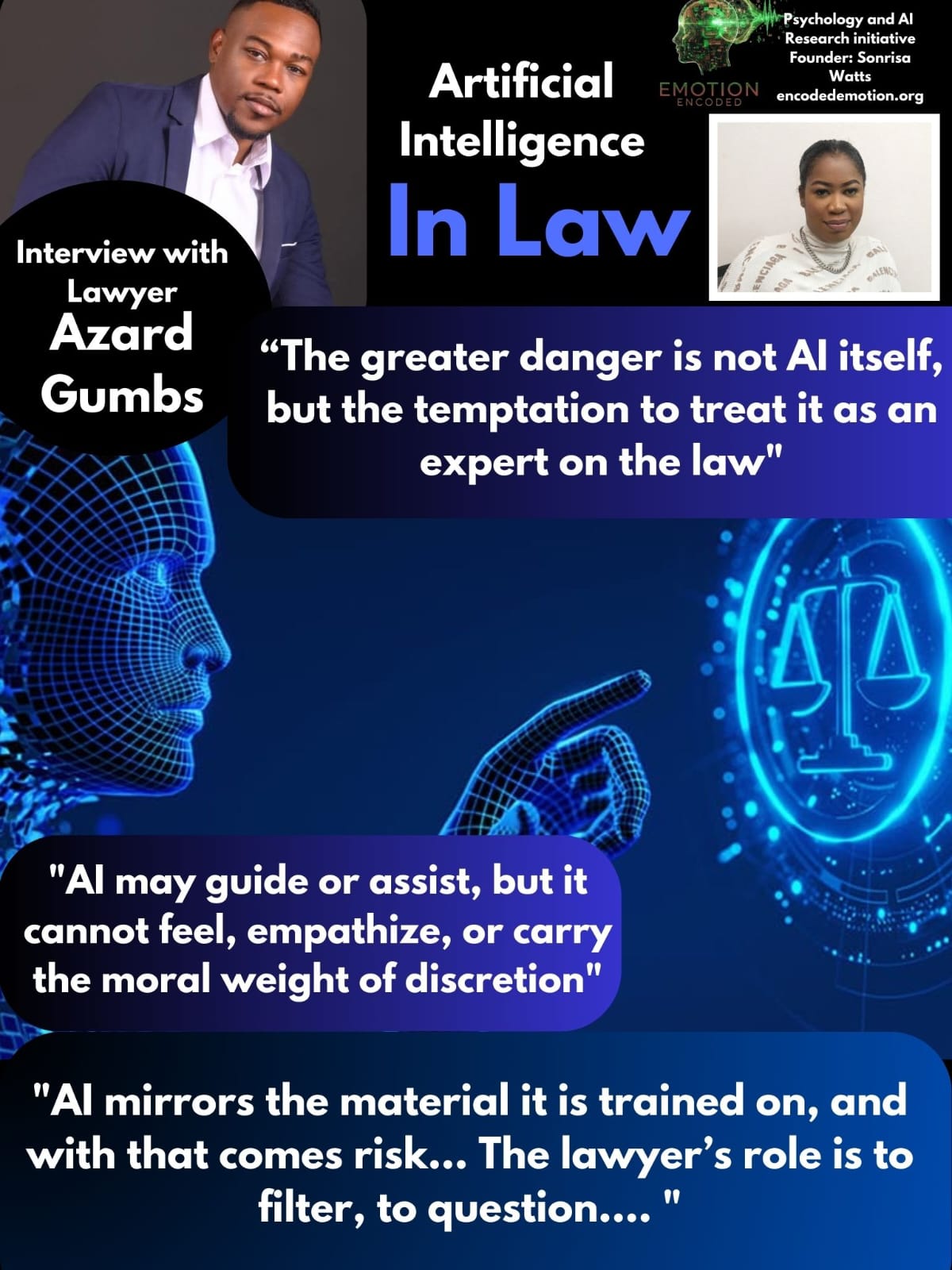At Emotion Encoded, we explore how professionals across different fields respond to the rise of artificial intelligence. Lawyers, perhaps more than most, face a delicate balance: AI promises to make research and drafting easier, yet it also raises profound questions about accuracy, judgment, and accountability.
To better understand this tension, we spoke with Azard Gumbs, a practicing lawyer. His reflections capture both the opportunities and the risks of AI in law, and they offer a clear message: technology must support, but never replace, human judgment.
Technology as Tool, Not Master
For Gumbs, the legal profession should not resist AI simply because it represents change. He sees the potential of AI to reduce repetitive workloads and streamline research. Yet he is quick to note its limits:
“I do not think lawyers should resist AI simply because it represents change. Technology, when properly used, can make research and drafting much easier. But AI is not perfect, it must always be checked to ensure accuracy. For me, it should remain a tool, never a master.”
This framing reflects a growing consensus that AI must remain an assistant, not a substitute.
The Danger of Over-Reliance
Efficiency should not be confused with expertise. Gumbs warns against the temptation to elevate AI into a position of authority within legal reasoning.
“The bigger risk is relying on AI as if it were an expert on the law. While it has clear advantages, it is far from foolproof. Errors do occur. The safest approach is to treat AI as an assistant, not as a substitute for professional judgment.”
His perspective echoes concerns across the legal field. AI tools can generate plausible answers, but plausibility is not the same as accuracy, and the cost of error in law is particularly high.
Support for Reasoning, Not a Replacement
Even when AI generates seemingly useful explanations, Gumbs insists they must be paired with a lawyer’s own training. He argues that vigilance remains a non-negotiable duty:
“Explanations from AI can be useful, but they are only valuable when paired with a lawyer’s own knowledge and training. A lawyer must constantly monitor for accuracy to ensure the system does not mislead. AI can support reasoning, but it cannot replace it.”
Bias and the Lawyer’s Responsibility
Another area of concern is bias. Gumbs acknowledges that while laws themselves may aim for neutrality, their application often reflects human bias. AI, trained on historical data, risks amplifying these distortions.
“I would not say that laws themselves are inherently biased, but I acknowledge that how they are applied and the data surrounding them may reflect bias. Since AI reproduces existing material, it falls to the lawyer to analyze, question, and filter that information. Our role is to prevent bias from being blindly reinforced.”
Here, Gumbs emphasizes the lawyer’s active responsibility: filtering, questioning, and intervening where AI might reinforce injustice.
Where Humans Must Always Lead
Despite the usefulness of AI, Gumbs draws a clear line in areas where human judgment cannot be replaced. He names family law and criminal defense as domains that demand human empathy, discretion, and moral responsibility.
“There are areas where humans must always lead, especially in cases involving family law or criminal defense. Humans have the ability to feel, to empathize, and to exercise discretion in a way AI cannot. AI may guide the process, but judgment in these areas must remain fully human.”
The Heart of the Profession
Ultimately, Gumbs affirms that while AI may take over certain repetitive tasks, the essence of law remains deeply human.
“AI should support lawyers, not replace them. It may take over repetitive tasks like research or first drafts, but the heart of the profession, which is analysis, advocacy, and judgment, will always rest with us as lawyers.”
The legal community is increasingly aware of both the promise and the risks of AI. Together, Gumbs’ reflections and the wider debate highlight an important truth: AI can support legal work, but the ultimate responsibility rests with human judgment, empathy, and duty.
